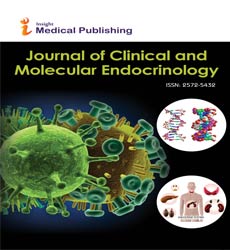Subclinical Hypothyroidism in the Elderly and Survival: Need for a Randomized Clinical Trial
Navid Mokhtari and Akbar Shafiee
Navid Mokhtari1 and Akbar Shafiee2,3*
1Student Research Committee, School of Medicine, Shahid Beheshti University of Medical Sciences, Tehran, Iran
2Department of Community Medicine, School of Medicine, Shahid Beheshti University of Medical Sciences, Tehran, Iran
3Department of Cardiovascular Research, Tehran Heart Center, Tehran University of Medical Sciences, Tehran, Iran
- Corresponding Author:
- Shafiee A
department of Cardiovascular Research
Tehran Heart Center, North Kargar Ave, Tehran, Iran
Tel: +98 21 88029600
Fax: +98 21 88029731
E-mail: Dr_shafiee@alborzi.com
Received Date: November 01, 2016; Accepted Date: November 12, 2016; Published Date: November 15, 2016
Citation: Mokhtari N, Shafiee A (2016) Subclinical Hypothyroidism in the Elderly and Survival: Need for a Randomized Clinical Trial. J Clin Mol Endocrinol 1:30. doi: 10.21767/2572-5432.100028
Copyright: © 2016 Mokhtari N et al. This is an open-access article distributed under the terms of the Creative Commons Attribution License, which permits unrestricted use, distribution, and reproduction in any medium, provided the original author and source are credited.
Letter To Editor
Subclinical hypothyroidism (SCH) is defined as an elevated serum thyroid-stimulating hormone (TSH) level and free thyroxine and triiodothyronine levels within their reference ranges.The estimated prevalence of subclinical hypothyroidism in the general population is 3–8% [1]. The prevalence of SCH increased with age and ranged from 7% to 26% in studies of the elderly [2].
Most thyroidologists agree that all patients with SCH and a serum TSH level above 10 mIU/L should be treated with levothyroxine. The available data suggest that treatment of mild SCH should be personalized [3]. Various factors may influence the decision to treat mild SCH. Hence, Clinicians should consider the patients’ age, the risk of progression to overt disease, the quality of life, the cognitive, metabolic and cardiovascular risk factors and the presence of associated co morbidities [4].
Although large randomized trials are needed, evidence suggests that treatment of mild SCH should probably be avoided in patients older than 60 years of age because there is no evidence that these patients are symptomatic and levothyroxine treatment does not improve their quality of life [5,6]. However, some data indicate that treatment of subclinical disease results in lipid profile improvement, but there is no evidence that this improvement is associated with a decrease in cardiovascular or all-cause mortality in elderly patients [2,6,7]. More importantly, it is not clear whether the thyroid hormone replacement can improve the survival of the elderly with SCH. Therefore, we propose a large-scale, preferably multicenter, randomized, placebo-controlled trial to conclusively show that effect of levothyroxine therapy on survival in the elderly, particularly the oldest olds. This can determine the impact of thyroid hormone replacement on survival and if does not affect the survival then this treatment should be reconsidered.
References
- Surks MI, Ortiz E, Daniels GH, Sawin CT, Col NF, et al. (2004) Subclinical thyroid disease: scientific review and guidelines for diagnosis and management. JAMA 291: 228-238.
- Garber JR, Cobin RH, Gharib H, Hennessey JV, Klein I, et al. (2014) Clinical practice guidelines for hypothyroidism in adults: cosponsored by the American Association of Clinical Endocrinologists and the American Thyroid Association. Endocrine practice : official journal of the American College of Endocrinology and the American Association of Clinical Endocrinologists. 18: 988-1028.
- Franklyn JA (2013) The thyroid--too much and too little across the ages. The consequences of subclinical thyroid dysfunction. Clin Endocrinol (Oxf) 78: 1-8.
- Virgini VS, Wijsman LW, Rodondi N, Bauer DC, Kearney PM, et al. (2014) Subclinical thyroid dysfunction and functional capacity among elderly. Thyroid 24: 208-214.
- Parle J, Roberts L, Wilson S, Pattison H, Roalfe A, et al. (2010) A randomized controlled trial of the effect of thyroxine replacement on cognitive function in community-living elderly subjects with subclinical hypothyroidism: the Birmingham Elderly Thyroid study. J Clin Endocrinol Metab 95: 3623-3632.
- Kahapola-Arachchige KM, Hadlow N, Wardrop R, Lim EM, Walsh JP. (2012) Age-specific TSH reference ranges have minimal impact on the diagnosis of thyroid dysfunction. Clin Endocrinol.77: 773-779.
- Biondi B, Cooper DS (2008) The clinical significance of subclinical thyroid dysfunction. Endocr Rev 29: 76-131.
Open Access Journals
- Aquaculture & Veterinary Science
- Chemistry & Chemical Sciences
- Clinical Sciences
- Engineering
- General Science
- Genetics & Molecular Biology
- Health Care & Nursing
- Immunology & Microbiology
- Materials Science
- Mathematics & Physics
- Medical Sciences
- Neurology & Psychiatry
- Oncology & Cancer Science
- Pharmaceutical Sciences
